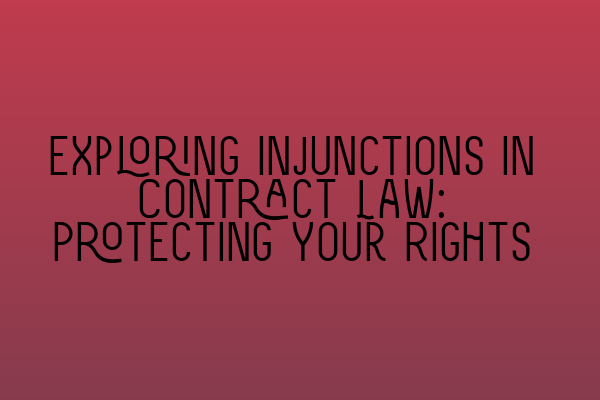Exploring Injunctions in Contract Law: Protecting Your Rights
When it comes to contract law, one essential concept to understand is the injunction. An injunction is a powerful legal tool that can be used to protect your rights and interests in contractual relationships. In this article, we will delve into the world of injunctions in contract law, exploring what they are, how they work, and when they may be appropriate to use.
What is an Injunction?
An injunction is a court order that requires a party to either do something or refrain from doing something. It is a form of equitable relief that aims to prevent harm or irreparable damage. In the context of contract law, an injunction may be sought to enforce a contractual obligation, prevent a breach of contract, or stop certain conduct that may negatively affect your rights.
Types of Injunctions
There are two main types of injunctions that can be sought in contract law:
- Prohibitory injunction: This type of injunction is used to stop a party from engaging in certain conduct that may breach the terms of a contract. For example, if Party A has agreed not to disclose confidential information to third parties, Party B can seek a prohibitory injunction to prevent Party A from sharing that information.
- Mandatory injunction: This type of injunction requires a party to perform a specific action that they are obligated to do under a contract. For instance, if Party A has failed to deliver goods as agreed, Party B can seek a mandatory injunction to compel Party A to fulfill their contractual obligation.
Both types of injunctions serve the purpose of maintaining the status quo or enforcing the terms of a contract, providing an efficient and effective legal remedy for protecting your contractual rights.
When Can You Seek an Injunction?
In order to seek an injunction, certain requirements must be met:
- Irreparable harm: You must demonstrate that without an injunction, you will suffer irreparable harm or damage that cannot be adequately compensated through monetary damages alone. This shows the necessity and urgency of obtaining an injunction.
- Likelihood of success: You must establish a strong likelihood of success on the merits of your case. This means presenting evidence that demonstrates the validity of your contractual rights and the potential harm you would suffer if the injunction is not granted.
- Balance of convenience: The court will consider the balance of convenience, weighing the potential harm caused by granting the injunction against the harm caused by not granting it. This includes considering the interests of both parties involved.
It is important to note that seeking an injunction is a serious legal undertaking that requires careful consideration and strategic planning. Engaging the services of an experienced contract law solicitor is highly recommended to guide you through the process and ensure the best possible outcome for your case.
The Benefits of Seeking an Injunction
Obtaining an injunction can offer several benefits in contract law:
- Preservation of rights: By seeking an injunction, you can protect your contractual rights and prevent any potential harm or losses that may occur as a result of a breach of contract.
- Efficient resolution: Injunctions provide a swift and effective remedy as they can stop or compel actions immediately without the need for lengthy legal proceedings.
- Preserving business relationships: In some cases, seeking an injunction can help preserve business relationships by encouraging parties to comply with their contractual obligations instead of ending the relationship entirely.
Real-Life Case Studies
If you’re interested in learning more about real-life case studies and gaining insights into legal practice and decision-making, check out our related article: Unveiling Real-Life Case Studies: Insights into Legal Practice and Decision-Making.
Work with an Experienced Contract Law Solicitor
Due to the complexities involved in seeking injunctions and the potential impact on your contractual relationships, it is crucial to work with an experienced contract law solicitor. A knowledgeable solicitor can provide expert guidance, help you navigate the legal process, and ensure the protection of your rights and interests.
If you’re interested in becoming a solicitor or want to explore the average earnings and factors affecting income in the UK legal landscape, check out our related article: Exploring Solicitor Salaries in the UK: Average Earnings and Factors Affecting Income.
Conclusion
Injunctions play a vital role in contract law, allowing individuals and businesses to protect their rights and interests. By seeking an injunction, you can prevent breaches of contract, enforce specific obligations, and preserve business relationships. However, the process of obtaining an injunction requires careful consideration and professional expertise. Engaging the services of an experienced contract law solicitor is essential to ensure the best possible outcome for your case. Remember, your rights matter, and an injunction can be a powerful tool in protecting them.
For more information on solicitor skills and client relationship management, read our related article: Mastering Client Relationship Management: Skills for Solicitors to Enhance Trust and Loyalty.
Ready to embark on your legal education journey? Find out more about pursuing a law school education in the UK and choosing the right path for your future: Pursuing a Law School Education in the UK: Choosing the Right Path for Your Future.
If you’re aspiring to become a solicitor, securing training contracts is crucial. Get a roadmap to becoming a solicitor and learn more about securing training contracts in our related article: Securing Training Contracts: A Roadmap to Becoming a Solicitor.
Your rights matter, and understanding injunctions can help you protect them. Consult a contract law solicitor today to explore how you can safeguard your interests and enforce your contractual rights.
